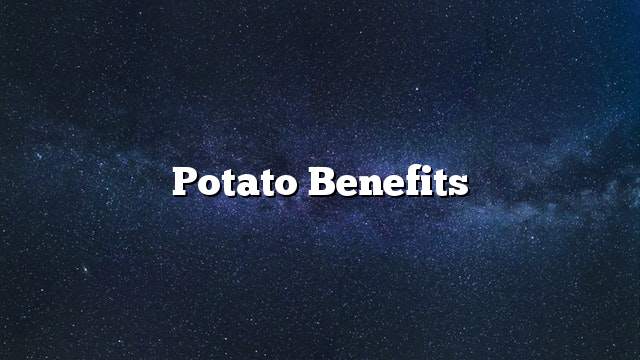potato
Potatoes are one of the most important and most widely consumed foods in the world. The potato bears the scientific name Solanum tuberosum, which originates in the Andean Highlands of South America. It is one of the most important sources of carbohydrates in the human diet. It is currently considered the fourth most important crop in the world. After wheat, rice and maize, due to their high yield productivity and nutritional value.
Many people are accused of being overweight, obese and not given health benefits. Some people avoid eating them if they try to follow a healthy diet. The desire to avoid carbohydrates is also contributing to diet. Some of the health and therapeutic purposes, so this article aims to clarify the reality of the health benefits of the potato.
Potato dietary composition
The following table shows the nutritional composition of each 100 g of potatoes that were boiled with the shell without adding salt:
| Food ingredient | the value |
|---|---|
| water | 76.98 g |
| energy | 87 calories |
| Protein | 1.87 g |
| Fats | 0.10 g |
| Carbohydrates | 20.13 g |
| Dietary fiber | 1.8 g |
| Total sugars | 0.91 g |
| Calcium | 5 mg |
| Iron | 0.31 mg |
| magnesium | 22 mg |
| Phosphorus | 44 mg |
| Potassium | 379 mg |
| Sodium | 4 mg |
| Zinc | 0.30 mg |
| Vitamin C | 13.0 mg |
| Thiamine | 0.106 mg |
| Riboflavin | 0.020 mg |
| Niacin | 1.439 mg |
| Vitamin B6 | 0.299 mg |
| Folate | 10 micrograms |
| Vitamin B12 | 0.00 μg |
| Vitamin A | 3 universal units, or 0 micrograms |
| Vitamin E (alpha-tocopherol) | 0.01 mg |
| Vitamin D | 0 universal unit |
| Vitamin K | 2.2 mg |
| Caffeine | 0 mg |
| Cholesterol | 0 mg |
Potatoes are given a good amount of dietary fiber, folate, niacin, pantothenic acid (vitamin B5), potassium, vitamin C, as well as thiamine and vitamin B6.
Potato benefits
Despite the fact that potatoes are known to many as one of the foods that should be avoided in a healthy diet, they provide many health benefits. Their husks contain a substance that may prevent bacteria from binding to cells. In addition, potatoes contain many elements Different food as the table above shows, which gives the body multiple health benefits, its benefits include the human body both of which come:
- Some limited scientific research has found benefits for eating potatoes in both gastric disorders and obesity. They are used in protein powder mixed with water and taken to help eliminate excess weight, but these effects need further research.
- Some limited scientific research has also found an impact on the use of outer potatoes on the skin in many cases, which include arthritis, infection infections, boils and burns, in addition to some other cases, and these effects also require further scientific research to clarify their effectiveness.
- Potatoes in their pulp and husks contain Phytochemicals, which include phenolic acids, anthocyanins, and carotenoids, which have antioxidant effects that prevent many Of chronic diseases, such as atherosclerosis, cancer, high blood pressure, some neurodegenerative diseases, and others.
- Despite the simple protein content of the potato, the protein it contains is a protein of high biological value, meaning that it contains a good proportion of the essential amino acids compared to other plant proteins.
- Potatoes provide calories and energy, making them suitable in poor countries as the main source of energy in the diet.
Side effects and toxicity
Potatoes, green potatoes and potato sprouts have some toxins that can not be eliminated by cooking. They cause some side effects, including headache, flushing, Nausea, vomiting, diarrhea, stomach pain, thirst, insomnia, and in some severe cases these toxins can cause death. As for the safety of the use of raw potatoes externally on the skin there is not enough research to find out.
It is necessary to avoid the use of potatoes in therapeutic quantities in pregnant and lactating women to have more scientific evidence on the safety of this, and diabetics should monitor their intake of potatoes, as the potatoes cooked gives carbohydrates easy to digest, which contribute to raise the level of blood glucose quickly after ingestion, It should also be taken into account that eating potatoes continuously and in large amounts can increase the risk of obesity and some related diseases, such as type 2 diabetes, cardiovascular disease.
In addition, potatoes contain some proteins that cause allergies to humans, which can cause some people to have severe allergic reactions, inflammation of the intestine, and nausea.
Drug Interactions
Large amounts of potatoes should be avoided by people who take blood-clotting drugs because they contain substances that also help prevent blood clotting. Eating large amounts of potatoes with these drugs increases the chance of bleeding and bruising.
Note : The topic of potato benefits is not a medical reference, please see your doctor.
To prepare a tasty and fast potato dish, just follow the following recipe for instant-cooked potato.
